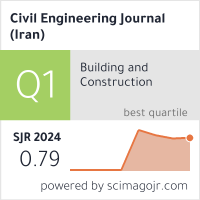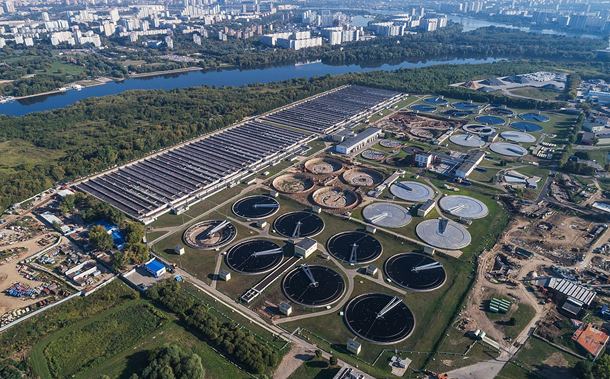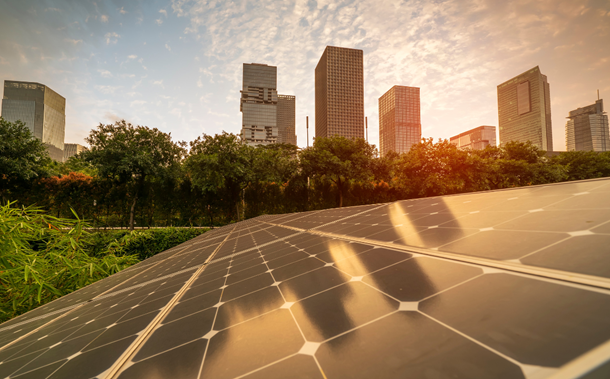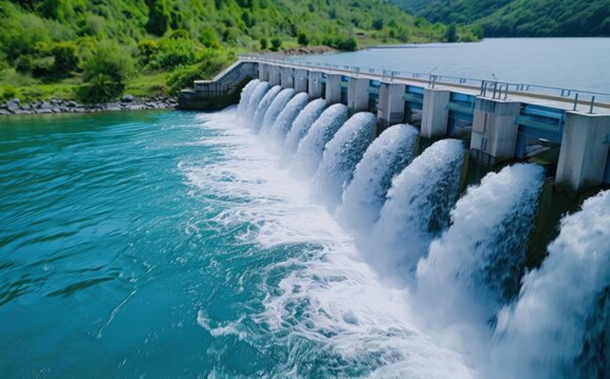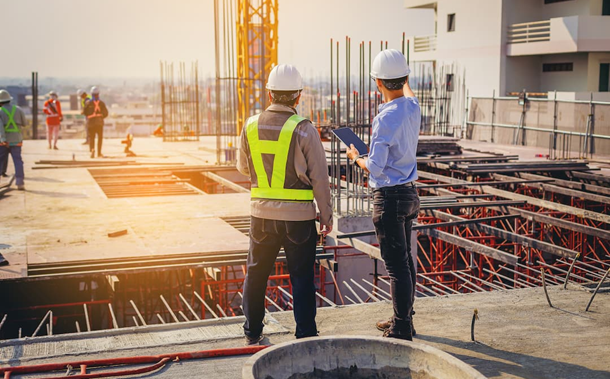Preloading Model on Soft Soil with Inclusion Thermal Induction Vertical and Incline Types
Downloads
Soft clay has a relatively low subgrade bearing capacity. The aim is to obtain physical values, mineralogy, mechanical strength values, values for reduction. The research method used is preloading in a test tube measuring 50í—70í—150 cm. Each cycle of preloading and thermal induction used a fixed load of 0.015 kg/cm². Thermal induction is given vertically and obliquely with temperature variations of 100, 200, 300, and 400 °C. The main observation point is a distance of 15 cm from the center of the induction. At 400 °C inclined induction, the water content is 17.36% (from the initial water content of 59.07%), the soil cohesion is 21.75. kN/m², the value of unconfined compressive strength is 67.72 kN/m², the highest modulus of elasticity is 4593 kN/m2, and the decrease is 5.13 cm. XRD, SEM, EDS results before heating showed mineralogy 0 (65.06%), Ca (13.30%), Na (3.64%), Mg (2.15%), Al (6.63%), Si (8.52%), Sn (0.70%) and did not change significantly after heating at 400 °C. The results after heating included 0 (58.39%), Ca (14.09%), Na (0.72%), Mg (1.16%), Al (6.63%), Si (14.72%), Sn (2.54%). The novelty obtained is to change very soft conditions became medium conditions.
Doi: 10.28991/cej-2021-03091705
Full Text: PDF
Downloads
[2] Minaei, Asgar, and Hamed Safikhani. "A New Transient Analytical Model for Heat Transfer of Earth-to-Air Heat Exchangers.” Journal of Building Engineering 33 (January 2021): 101560. doi:10.1016/j.jobe.2020.101560.
[3] Liu, Quan, Yue-Bao Deng, and Tian-Yuan Wang. "One-Dimensional Nonlinear Consolidation Theory for Soft Ground Considering Secondary Consolidation and the Thermal Effect.” Computers and Geotechnics 104 (December 2018): 22–28. doi:10.1016/j.compgeo.2018.08.007.
[4] Wang, Lei, Yongfu Xu, Xiaohe Xia, and De'an Sun. "Semi-Analytical Solutions to Two-Dimensional Plane Strain Consolidation for Unsaturated Soil.” Computers and Geotechnics 101 (September 2018): 100–113. doi:10.1016/j.compgeo.2018.04.015.
[5] Das, Braja M. "Fundamentals of Geotechnical Engineering.” United States America, Cengage Learning, (1999).
[6] Anjum, F., M.Y. Naz, A. Ghaffar, S. Shukrullah, N.M. AbdEl-Salam, and K.A. Ibrahim. "Study of Thermal and Mechanical Traits of Organic Waste Incorporated Fired Clay Porous Material.” Physica B: Condensed Matter 599 (December 2020): 412479. doi:10.1016/j.physb.2020.412479.
[7] Li, Baiyi, Jixiong Zhang, Seyed Ali Ghoreishi-Madiseh, Marco Antonio Rodrigues de Brito, Xuejie Deng, and Ali Fahrettin Kuyuk. "Energy Performance of Seasonal Thermal Energy Storage in Underground Backfilled Stopes of Coal Mines.” Journal of Cleaner Production 275 (December 2020): 122647. doi:10.1016/j.jclepro.2020.122647.
[8] Wang, Chu, and Patrick J. Fox. "Analytical Solutions for Heat Transfer in Saturated Soil with Effective Porosity.” Journal of Geotechnical and Geoenvironmental Engineering 146, no. 9 (September 2020): 04020095. doi:10.1061/(asce)gt.1943-5606.0002324.
[9] Hazirbaba, Kenan. "Effects of Freeze-Thaw on Settlement of Fine Grained Soil Subjected to Cyclic Loading.” Cold Regions Science and Technology 160 (April 2019): 222–229. doi:10.1016/j.coldregions.2019.02.008.
[10] Harris, Willie, and G. Norman White. "X-Ray Diffraction Techniques for Soil Mineral Identification.” SSSA Book Series (October 26, 2015): 81–115. doi:10.2136/sssabookser5.5.c4.
[11] Barreiro, Ana, Alba Lombao, Angela Martín, Javier Cancelo-González, Tarsy Carballas, and Montserrat Díaz-Raviña. "Soil Heating at High Temperatures and Different Water Content: Effects on the Soil Microorganisms.” Geosciences 10, no. 9 (September 5, 2020): 355. doi:10.3390/geosciences10090355.
[12] Al-Kinani, Ali M., and Mahmood D. Ahmed. "Comparison of Single and Group Jet Grouting Columns Capacity Based on Field Load Test and Theoretical Methods.” Civil Engineering Journal 5, no. 6 (June 23, 2019): 1353–1366. doi:10.28991/cej-2019-03091337.
[13] Sofyan, Sarwo Edhy, Eric Hu, Andrei Kotousov, Teuku Meurah Indra Riayatsyah, Khairil, and Hamdani. "A New Approach to Modelling of Seasonal Soil Temperature Fluctuations and Their Impact on the Performance of a Shallow Borehole Heat Exchanger.” Case Studies in Thermal Engineering 22 (December 2020): 100781. doi:10.1016/j.csite.2020.100781.
[14] Lv, Zhixiang, Gangqiang Kong, Hanlong Liu, and Charles W. W. Ng. "Effects of Soil Type on Axial and Radial Thermal Responses of Field-Scale Energy Piles.” Journal of Geotechnical and Geoenvironmental Engineering 146, no. 10 (October 2020): 06020018. doi:10.1061/(asce)gt.1943-5606.0002367.
[15] Gao, Yan, Shuyue Dong, Chuang Wang, Yanhong Chen, and Wenju Hu. "Effect of Thermal Intensity and Initial Moisture Content on Heat and Moisture Transfer in Unsaturated Soil.” Sustainable Cities and Society 55 (April 2020): 102069. doi:10.1016/j.scs.2020.102069.
[16] Rotta Loria, Alessandro F., and Jibril B. Coulibaly. "Thermally Induced Deformation of Soils: A Critical Overview of Phenomena, Challenges and Opportunities.” Geomechanics for Energy and the Environment 25 (March 2021): 100193. doi:10.1016/j.gete.2020.100193.
[17] Fu, Yanbin, Siyue He, Sizhan Zhang, and Yong Yang. "Parameter Analysis on Hardening Soil Model of Soft Soil for Foundation Pits Based on Shear Rates in Shenzhen Bay, China.” Advances in Materials Science and Engineering 2020 (February 18, 2020): 1–11. doi:10.1155/2020/7810918.
[18] Shen, Yan-Jun, Yu-Liang Zhang, Feng Gao, Geng-She Yang, and Xing-Ping Lai. "Influence of Temperature on the Microstructure Deterioration of Sandstone.” Energies 11, no. 7 (July 4, 2018): 1753. doi:10.3390/en11071753.
- Authors retain all copyrights. It is noticeable that authors will not be forced to sign any copyright transfer agreements.
- This work (including HTML and PDF Files) is licensed under a Creative Commons Attribution 4.0 International License.![]()




